 Petzlover
Petzlover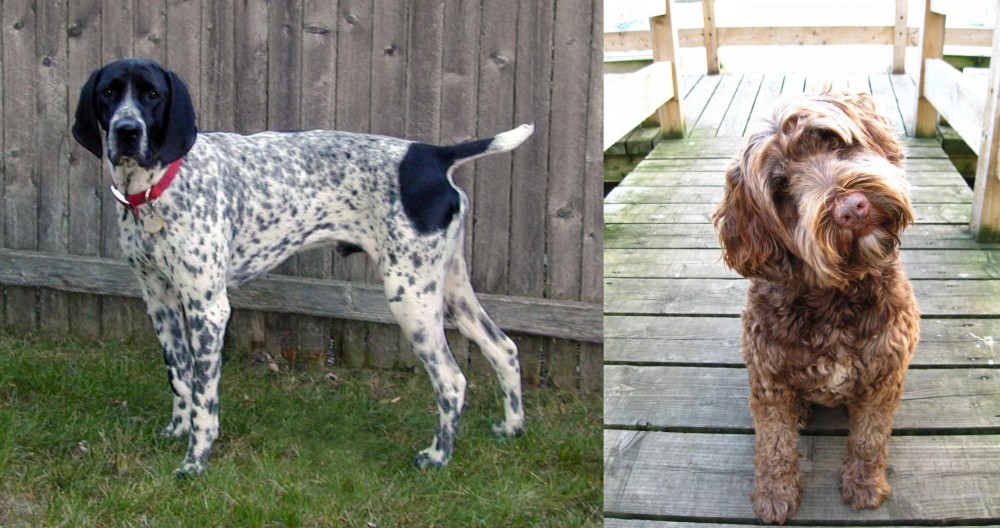 Braque d'Auvergne is originated from France but Portuguese Water Dog is originated from Portugal. Braque d'Auvergne may grow 8 cm / 4 inches higher than Portuguese Water Dog. Braque d'Auvergne may weigh 35 kg / 78 pounds more than Portuguese Water Dog. Both Braque d'Auvergne and Portuguese Water Dog has same life span. Both Braque d'Auvergne and Portuguese Water Dog has almost same litter size. Both Braque d'Auvergne and Portuguese Water Dog requires Low Maintenance.
Braque d'Auvergne is originated from France but Portuguese Water Dog is originated from Portugal. Braque d'Auvergne may grow 8 cm / 4 inches higher than Portuguese Water Dog. Braque d'Auvergne may weigh 35 kg / 78 pounds more than Portuguese Water Dog. Both Braque d'Auvergne and Portuguese Water Dog has same life span. Both Braque d'Auvergne and Portuguese Water Dog has almost same litter size. Both Braque d'Auvergne and Portuguese Water Dog requires Low Maintenance.
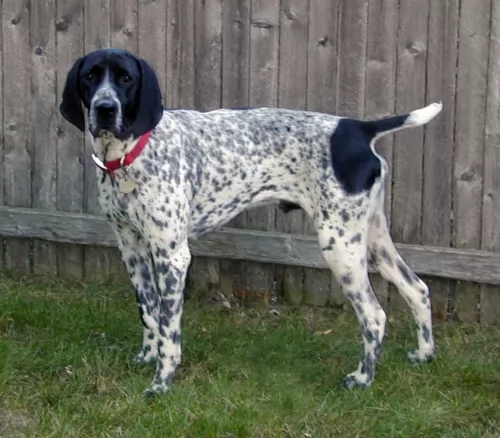 Sometime over 5 centuries ago, in the Cantal Region of France, was born a hunting breed, that might be the real ancestor of today’s pointing hunter dogs. Perhaps the oldest of all pointing gun dog is the Braque d’Auvergne. This breed comes from Central France in the region of Auvergne. This breed was developed prior to written dog breeding records in order to hunt in this region and find, point, flush out and retrieve fowl. This breed is clearly one of if not the oldest breeds in the French Braque. There is no agreement among historians on what breed is the oldest of the European pointing dogs and where they were developed – was it Spain or was it France? It is thought that the Braque Francais Gascogne is the original one of these in the early 1600’s while the Braque d’Auvergne came soon after. Due to the different hunting needs in the different parts of France, the Braque Francais Gascogne was crossed with a lot of other local scent hounds. The Braque d’Auvergne is one of the very oldest of all of these. There are records of the breeds existence in the 1700’s. It is probable that the Braque d’Auvergne was developed by crossing local dogs with Gascogne as well as with the Petit Bleu de Gascogne and the Grand Bleu de Gascogne.
Sometime over 5 centuries ago, in the Cantal Region of France, was born a hunting breed, that might be the real ancestor of today’s pointing hunter dogs. Perhaps the oldest of all pointing gun dog is the Braque d’Auvergne. This breed comes from Central France in the region of Auvergne. This breed was developed prior to written dog breeding records in order to hunt in this region and find, point, flush out and retrieve fowl. This breed is clearly one of if not the oldest breeds in the French Braque. There is no agreement among historians on what breed is the oldest of the European pointing dogs and where they were developed – was it Spain or was it France? It is thought that the Braque Francais Gascogne is the original one of these in the early 1600’s while the Braque d’Auvergne came soon after. Due to the different hunting needs in the different parts of France, the Braque Francais Gascogne was crossed with a lot of other local scent hounds. The Braque d’Auvergne is one of the very oldest of all of these. There are records of the breeds existence in the 1700’s. It is probable that the Braque d’Auvergne was developed by crossing local dogs with Gascogne as well as with the Petit Bleu de Gascogne and the Grand Bleu de Gascogne.
In all of Western Europe, the region of Auvergne is not very populated and has unique geography in that is hilly and has many extinct and eroded volcanoes. A lot of the region is still unpopulated. In this environment, wildlife has flourished, and hunting is successful in providing food for the regions people. This circumstance with an abundance of birds, led to the breeding of the Braque Auvergne to specialize in hunting in this area. The breed is not very popular outside of Auvergne and probably never was. That fact allowed them to be devastated by the Second World War. The Reunion des Amateurs de Braque d’Auvergne (RABA) was started to promote the pure breeding and the protection of the d’Auvergnes. But when Auvergnes was occupied during the war, the slowed breeding of the Braque d ‘ Auvergne almost eliminated the breed. There might have only been about 25 dogs left following the end of the war. These remaining dogs were used to revive the breed, but it is still uncommon, but not rare. Individuals have been imported by other countries including North America. The United Kennel Club (UKC) accepted the breed in 2006 but is not accepted by the AKC (American Kennel Club). The breed is still a working breed and outside of France, very rare.
 The Portuguese Water Dog is a working dog hailing from the Portuguese region of the Algarve. The dog has always been a friend of the sea, working around fishing boats, loving his life around water.
The Portuguese Water Dog is a working dog hailing from the Portuguese region of the Algarve. The dog has always been a friend of the sea, working around fishing boats, loving his life around water.
He descends from dogs that have always been used by Portuguese fishermen, and its believed he has Poodle in him. Known also as the Cao de Agua, which means Dog of the Water, the Portie as he is also known, almost disappeared.
Their numbers dropped in the early 20th century, but a certain Vasco Bensuade saved the breed, forming a breed club, writing a breed standard.
They then also made their way to England and the United States. It was in 1972 that the Portuguese Water Dog Club of America formed. In 1983, the AKC recognized the dog as a distinct breed.
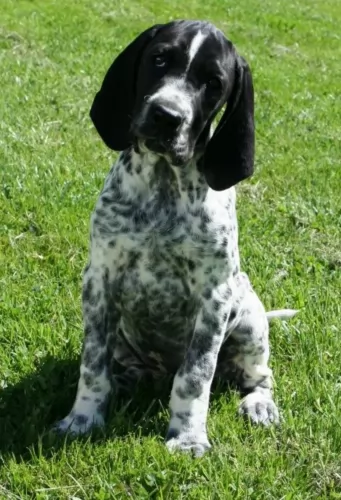 The Braque d’Auvergne is a well built, strong hunting dog with long ears, a large head and a docked tail. His coat is white with black markings and black ears and head. The breed looks a lot like all the other pointing dogs from France. They are medium in stature and has the appearance of a working gundog. He is athletic, muscular and fit. Docking the tail is outlawed in many countries and all of the United Kingdom. In that case the tail is high on the rump and always straight. Their face and head are big for the size of the body and shaped like an oval. With a long muzzle, deep set eyes and a gentle expression, they are kindly and handsome dogs. Their skin is loose but not droopy or wrinkled like hound dogs.
The Braque d’Auvergne is a well built, strong hunting dog with long ears, a large head and a docked tail. His coat is white with black markings and black ears and head. The breed looks a lot like all the other pointing dogs from France. They are medium in stature and has the appearance of a working gundog. He is athletic, muscular and fit. Docking the tail is outlawed in many countries and all of the United Kingdom. In that case the tail is high on the rump and always straight. Their face and head are big for the size of the body and shaped like an oval. With a long muzzle, deep set eyes and a gentle expression, they are kindly and handsome dogs. Their skin is loose but not droopy or wrinkled like hound dogs.
 Standing at between 43 and 57cm in height and weighing in the region of 16 to 27kg, the Portuguese Water Dog is a medium-sized, curly-coated dog.
Standing at between 43 and 57cm in height and weighing in the region of 16 to 27kg, the Portuguese Water Dog is a medium-sized, curly-coated dog.
It is believed that the dog is hypoallergenic. He does however shed, though not a lot. He just loves the water and is always ready to plunge in. One of the distinctive characteristics of this dog is its webbed feet.
The Portuguese Water Dog is an intelligent dog that will do well with training and socialization.
It won’t be troublesome training this dog as he is intelligent. They're also calm dogs. Referred to fondly as the Portie, this is a fun-loving dog, friendly and social, getting on well with all members of his human family.
These dogs get on well with children and other family pets. They can be reserved toward strangers, but this makes them good watchdogs.
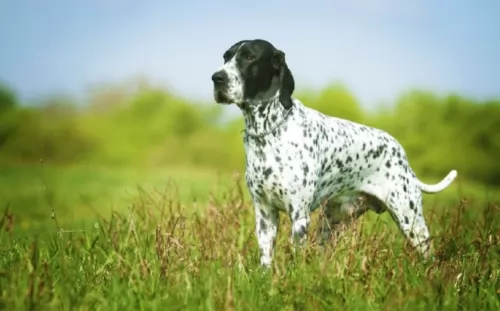 This is a gentle, adaptable and obedient breed. With their intelligence and affectionate nature, they make great family dogs and are eager to please their people. Living with other dogs is fine but not with small, prey size animals. The Braque d’Auvergne should never be left alone pets like gerbils and hamsters. They must be socialized to cats as pets and not prey before living with them successfully. They need to work closely with one human partner. They are first and foremost a hunting dog and need some sort of hunting simulation. They are devoted to their families and want to be constantly in their presence. This can lead to separation anxiety if they are left alone too much. They are great with children and need a family.
This is a gentle, adaptable and obedient breed. With their intelligence and affectionate nature, they make great family dogs and are eager to please their people. Living with other dogs is fine but not with small, prey size animals. The Braque d’Auvergne should never be left alone pets like gerbils and hamsters. They must be socialized to cats as pets and not prey before living with them successfully. They need to work closely with one human partner. They are first and foremost a hunting dog and need some sort of hunting simulation. They are devoted to their families and want to be constantly in their presence. This can lead to separation anxiety if they are left alone too much. They are great with children and need a family.
 With training, your Portie can make a splendid pet. He is also adaptable to different living situations, and is capable of living in the city or in the countryside, just so long as his exercise needs are met.
With training, your Portie can make a splendid pet. He is also adaptable to different living situations, and is capable of living in the city or in the countryside, just so long as his exercise needs are met.
He is such an affectionate and loyal, fun-loving dog while also being hard working, and all these wonderful characteristics mean that he can be a treasured pet and companion.
 The Braque d’Auvergne is a healthy breed but can face some of the same health concerns as other pointers and hunting dogs. The long, droopy ears can get infected easily if wet and need to be cleaned regularly so that food or dirt are not trapped their either. Because of the small gene pool however they may be at risk for several issues. The breeders in France express concerns about possible hip dysplasia and testing is highly recommended. Because they are at risk for other conditions that might not show up until later in life, it is also recommended that they be tested by the Canine Eye Registration Foundation (CERF) as well as the Orthopedic Foundation for Animals (OFA).
The Braque d’Auvergne is a healthy breed but can face some of the same health concerns as other pointers and hunting dogs. The long, droopy ears can get infected easily if wet and need to be cleaned regularly so that food or dirt are not trapped their either. Because of the small gene pool however they may be at risk for several issues. The breeders in France express concerns about possible hip dysplasia and testing is highly recommended. Because they are at risk for other conditions that might not show up until later in life, it is also recommended that they be tested by the Canine Eye Registration Foundation (CERF) as well as the Orthopedic Foundation for Animals (OFA).
 Portuguese Water Dogs are generally healthy, but like most other dogs they are more prone to certain heath conditions, though your pet is unlikely to get any of them. Still it pays to know of some of the more complicated- and disabling ones.
Portuguese Water Dogs are generally healthy, but like most other dogs they are more prone to certain heath conditions, though your pet is unlikely to get any of them. Still it pays to know of some of the more complicated- and disabling ones.
This is where the thighbone doesn't fit properly into the hip joint. Hip dysplasia spells pain for your dog and he may show lameness with one or both rear legs. Arthritis can develop too.
Hip dysplasia is hereditary, but it can be worsened by allowing your dog to become obese and from injuries from leaping off your bed for instance.
This is a degenerative eye disorder that can lead to blindness, but fortunately it is detectable long before the dog shows signs of blindness.
Reputable breeders have the eyes of their dog certified each year by a veterinary ophthalmologist and they don’t allow the dogs to produce puppies.
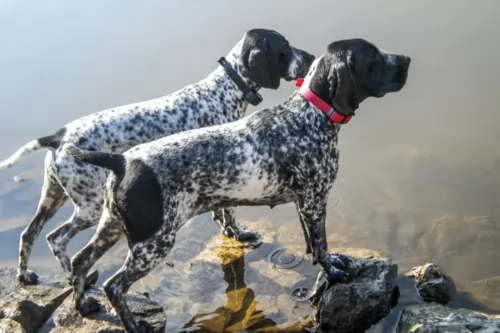 The Braque d’Auvergne needs a high-quality diet fit for a working dog but not too much to make him obese. They are an active breed to choose a formula that is designed for working dogs.
The Braque d’Auvergne needs a high-quality diet fit for a working dog but not too much to make him obese. They are an active breed to choose a formula that is designed for working dogs.
Although no studies have been conducted on the Braque d’Auvergne’s health issues there are many conditions that similar breeds are susceptible to and the d’Auvergne might be as well. This includes any of the following:
This is an active, working dog who needs a lot of stimulation and exercise. The only real appropriate exercise for these dogs is hunting or outings in the woods. He not only needs the exercise, but he also needs to stimulate his sense of smell and his gundog intelligence. He might excel in lure chase or even a form or barn hunt. They certainly could excel at obedience trials and perhaps rally. If you are a weekend hunter then this is the ideal dog for you. They are so easy to train that they surpass other pointers for success with casual hunters. They hunt at a slower pace than many other gundogs. Their intelligence and athleticism lend itself well to agility and flyball also. They need a large (+acres)fenced in area to run and play.
 Your Portie is a dog that loves outdoor life and lots of exercise. Take him with you on your walks and give him a run off his leash. When he gets home, if you have a pool h’ll be the first to plunge right in. He makes a great pet to have at the sea too.
Your Portie is a dog that loves outdoor life and lots of exercise. Take him with you on your walks and give him a run off his leash. When he gets home, if you have a pool h’ll be the first to plunge right in. He makes a great pet to have at the sea too.
Provide him with plenty of nice chewy toys, balls and ropes so he doesn’t get bored.
Provide him with a nice, dry, warm sleeping area and don’t allow him to be disturbed when he retreats there.
Keep his vaccines up to date to prevent some life threatening illnesses.
Provide him with high quality food that has lots of vitamins and minerals instead of fillers, preservatives, colorants and toxins.
There are some excellent commercially manufactured dog foods which can be convenient and good for your pet. Try and provide him with some tasty homemade food occasionally. Nothing spicy and exotic. Dogs thrive on simplicity and consistency.
Boiled chicken, brown rice or pasta, carrots, spinach and sweet potatoes chopped up and added twice week to the dry kibble is all your dog requires to keep him energetic happy, thankful, healthy and happy.
A little bit of raw meat added in from time to time will be superb. See that he always has access to clean, cool water.